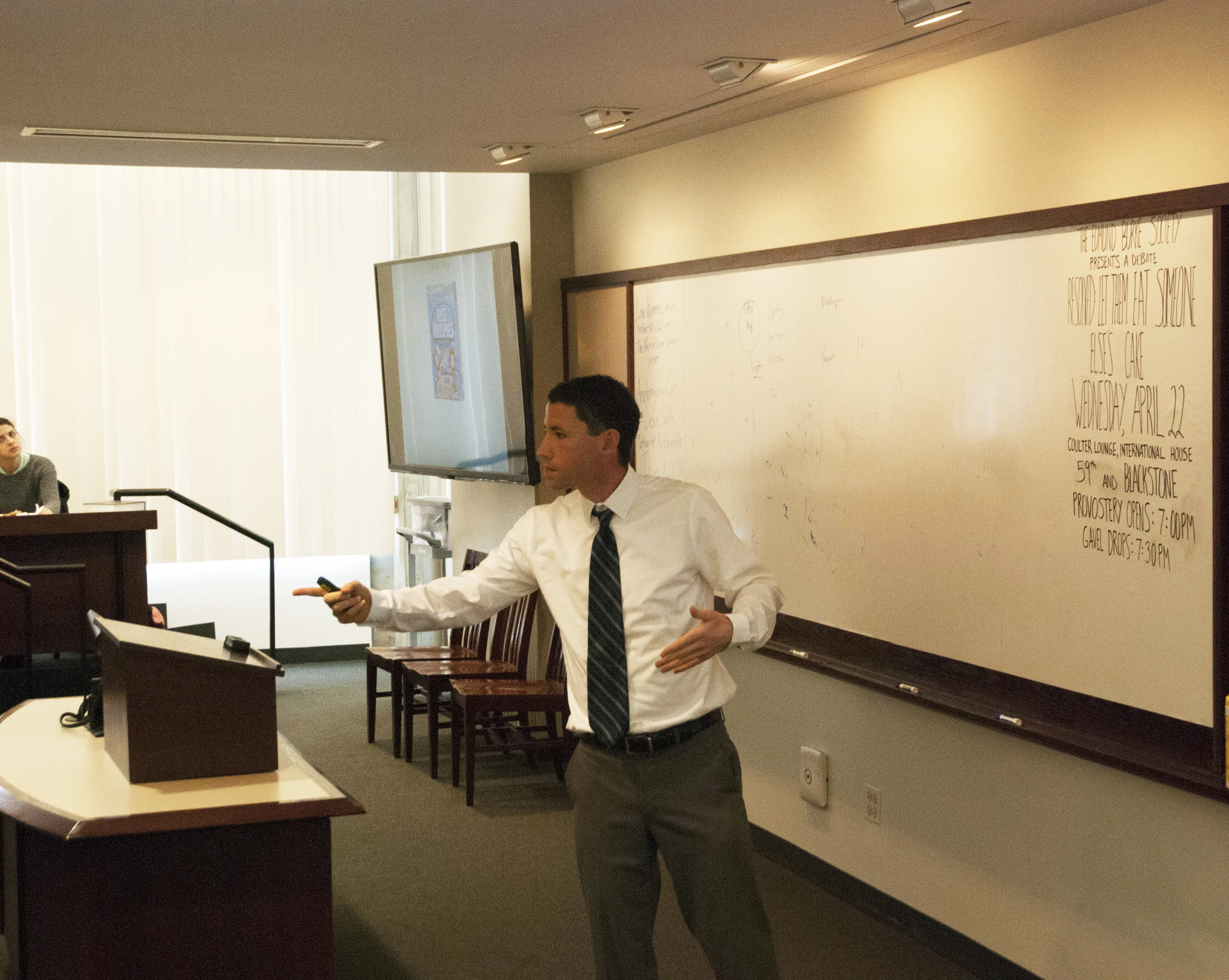Learning the Language of Leadership

Patrick Barry’s presentations for the Keystone Program remind students that the words they choose can change the world people see. Lawyers, he tells them, have a responsibility to understand the gravity of their writing and construct meaningful sentences accordingly. It’s a concept that Barry, ’12, first learned at the Law School, and one he’s now eager to share with future attorneys.
While clerking for Judge Jennifer A. Dorsey and Judge Andrew P. Gordon in the federal district court of Nevada, Barry returned to the Law School each quarter last year to teach a three-part series on effective writing for the popular Keystone Professionalism & Leadership Program.
Barry’s workshop was called the Language of Leadership, and like all Keystone programs, it offered students practical skills to prepare them for their legal careers. Keystone’s lectures cover topics that range from improving oral communication to cultivating professional judgement to developing interpersonal skills. Barry, who has a PhD in literature from the University of Michigan and taught in the University of Chicago Writing Program, led sessions that fell into Keystone’s Written Communication category.
With each presentation building upon the last, students in Barry’s three workshops learned the fundamentals of effective writing. Some of Barry’s strategies include: creatively using syntax to change the focus of a sentence; picking particular examples to describe broader topics; and tapping into the “Rule of Three” when communicating a multi-part list. (As this sentence just did.) “Much of what lawyers do, every day, is construct sentences, whether in briefs or client pitches or even just in emails to other lawyers,” Barry said. “So it’s crucial we figure out how to construct those sentences thoughtfully.”
Barry participated in Keystone as a student and especially remembers a program called “How I Write.” There, Barry learned from Law School professors such as Alison Siegler, Douglas Baird, Geoffrey Stone, and Craig Futterman about how each of them turns “scarily blank pages into readable, persuasive ones,” an objective that defines Barry’s own Keystone presentations.
“Patrick is a great fit for the Keystone Program not just because he’s a fantastic writer and speaker, but because as a recent graduate—and a product of the Keystone Program himself—he understands why these skills are critical,” Dean of Students Amy Gardner said.
When Barry worked with the Mandel Clinic’s Mental Health Project, he learned firsthand why lawyers must write persuasively. Clinical Professor Mark Heyrman taught him that, as Barry put it, “When you are writing a brief, you are essentially writing someone’s life. It’s an enormous responsibility.”
Barry was completing the coursework for his PhD when he started his law degree, and he is grateful that the Law School always supported his dual-degree aspirations. Twice Martha Nussbaum, Ernst Freund Distinguished Service Professor of Law and Ethics, invited him to participate in the Law and Literature conferences she puts on every other year. He also took “Milton and the Law,” a Greenberg Seminar Professor Nussbaum taught with Senior Lecturer Richard Posner, a judge on the United States Court of Appeals for the Seventh Circuit, Alison LaCroix, Robert Newton Reid Professor of Law, and Lecturer Randy Berlin. “I never got the sense when I was doing the PhD that folks at the Law School thought it a waste of time,” he said. “Everyone was very encouraging. Dean Gardner even sat down with me each term to help me construct a schedule that would let me continue to pursue both degrees at the same time.”
As a 3L, Barry was one of four students to win the University of Chicago’s Wayne C. Booth Graduate Student Prize for Excellence in Teaching, becoming the first law student ever to do so. And after graduating, while finishing up his PhD at Michigan, Barry worked with their law school’s Human Trafficking Clinic and Child Welfare Appellate Clinic before beginning his clerkship.
Now, Barry continues to stress the Law School’s mission of interdisciplinary inquiry through his Keystone programs. During his Language of Leadership workshop, for instance, Barry uses examples from the speeches of Ronald Reagan, the novels of Gabriel García Márquez, and even the lyrics of Marvin Gaye. “Sometimes the best way to become a better legal writer,” Barry said, “is to read sentences not actually written by lawyers.”
When asked to give advice to new lawyers, Barry offered two suggestions from the “Words to Write By” slides he uses at the end of his Keystone presentations: “To write good sentences, you need to read good sentences” and “Trying to sound smart is a pretty dumb strategy.”
Barry explained the second suggestion this way: “The best advocates, like John Roberts before he became Justice Roberts, and current Supreme Court specialists Lisa Blatt and Tom Goldstein, are really good at taking complex ideas and making them seem helpfully simple.”
For many lawyers, he said, their best legal writing emerges when they “stop trying to impress their audience and instead just try to connect with them.”